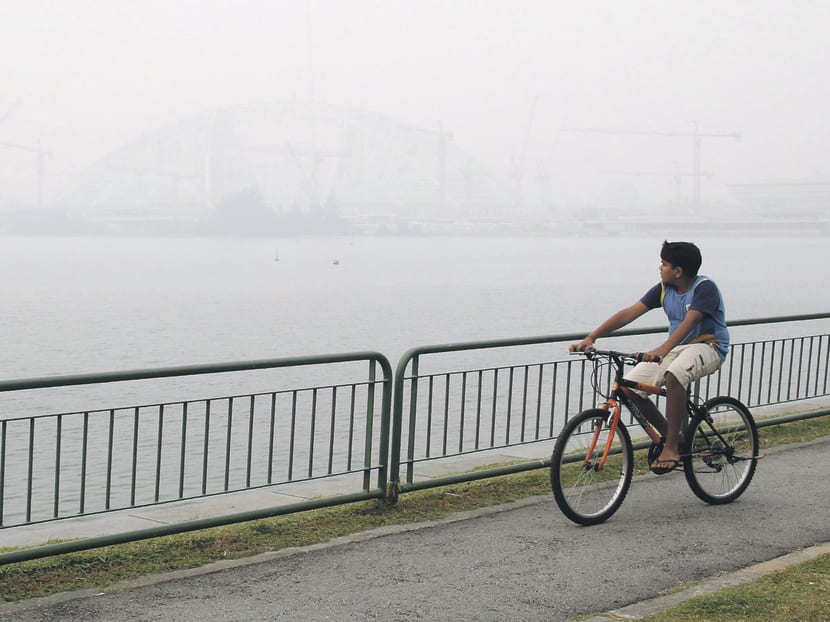Jakarta backs Singapore’s plan to fight haze with heftier fines
JAKARTA — The incoming President of Indonesia, a holdout in South-east Asia’s pact to fight haze, is backing Singapore’s plan to wield heftier fines against overseas polluters as long as Indonesia’s sovereignty is respected.
JAKARTA — The incoming President of Indonesia, a holdout in South-east Asia’s pact to fight haze, is backing Singapore’s plan to wield heftier fines against overseas polluters as long as Indonesia’s sovereignty is respected.
Mr Joko Widodo, the Jakarta Governor known as Jokowi who won this month’s presidential election, agrees that companies implicated in unlawful fires may be fair game for Singapore’s enforcers.
“We should have some detailed protocols to guarantee the sovereignty of Indonesia,” said Mr Sonny Keraf, Indonesia’s Environment Minister from 1999 to 2001 and adviser to Mr Widodo. “But we do appreciate the commitment of the government in Singapore to penalise these companies’ activities,” he said.
A year after the city-state endured its worst-ever air quality, Singapore presented a Bill to Parliament this month that subjects foreign companies to as much as S$2 million in fines for illegal emissions, up from S$300,000 previously. Indonesia and Singapore have a long-standing dispute over the haze that blows in from land-clearing fires in Sumatra.
Accelerating deforestation makes Indonesia the world’s third-largest emitter after China and the United States, estimates from organisations, including the World Bank, showed.
An outbreak of fires in Riau, a centre of Indonesia’s palm oil and paper industries on Sumatra island, were blamed for last year’s record smog in Singapore. Singapore’s Pollutant Standards Index peaked at 401 in June last year, 100 points above the “hazardous” threshold.
While the index in Singapore has not topped 100 this year and stood at about 54 as of noon yesterday, an El Nino weather pattern may bring drought and worse smog this year to South-east Asia, said Environment Minister Vivian Balakrishnan, who expects final approval for the bigger fines next month.
“There is a high risk of unusually dry conditions in Riau and Sumatra in August and September,” Mr Nigel Sizer, global director of forests at World Resources Institute, said.
Washington-based WRI is working with Google and forestry agencies in Indonesia to use satellite imaging to pinpoint and respond to fires.
“On social media and in the streets, we have seen the Indonesian people asking for better information about where these fires are occurring and how their government is responding,” Indonesia’s Deputy Foreign Minister Dino Patti Djalal said.
Singapore’s new fines will require Indonesia to cooperate in the gathering of evidence in its territories, which may be seen as an infringement, said Singapore Management University’s associate professor of law Eugene Tan. The city would need “watertight” evidence to win in local courts, he added.
By pursuing culprits in Indonesia, Singapore may risk retaliation, said Mr Alan Khee-Jin Tan of the National University of Singapore’s Law School. “There is a likelihood of Indonesian lawmakers enacting retaliatory laws that target individuals or entities in Singapore for infringing Indonesian law,” he said. “That would be diplomatically messy.”
Indonesia has yet to ratify the Association of Southeast Asian Nations’ (ASEAN) 2002 haze treaty, which requires nations to take steps against forest fires and cooperate with neighbours. Many Indonesians see it as “ganging up”, said Mr Steve Wilford, Asia Pacific director at London-based Control Risks, a consultant on corporate threats and government corruption.
Indonesia’s Parliament is weighing the Transboundary Haze Bill, Mr Agus Setyaki, a division head at the Ministry of Environment, said on July 10. Parliament hopes to approve the Bill in September before current legislators end their terms.
Mr Widodo will push to extend the ASEAN pact beyond haze to include other environmental threats, Mr Keraf said. The next President also plans to continue a moratorium on new permits to develop peatlands and primary forests. The ban, set to expire in 2015, was part of an agreement for US$1 billion (S$1.2 billion) in aid from Norway.
Mr Widodo wants a network of drones to help monitor and stop land misuse across an archipelago of 17,000 islands that would stretch from New York to Alaska. “Drones are not only for the military, but also for the economy, such as for illegal logging,” he said in an interview on July 21. BLOOMBERG







